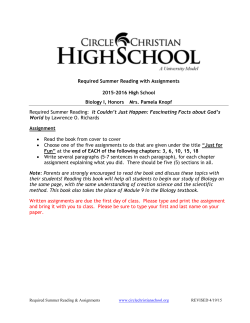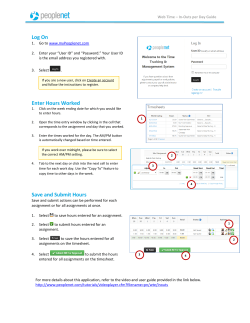
NFS 1020 - Dixie State University
Family and Consumer Science Department Dixie State University Scientific Foundations of Nutrition: NFS 1020 Course Name: Scientific Foundations of Nutrition CRN: 23069 Semester/Year: Spring2015 Instructor: Linda M. Wright Email Address: lwright@dixie.edu Office Hours: T/R 8:00 -10:30 a.m. Course Number: NFS 1020 Meeting Days and Time: ONLINE Location: ONLINE Credits: 3 Office Phone: 652-7866 Office Location: NIB #110 Prerequisites: None Lab and other fees: None Course Description: Fulfills General Education Life Science requirement. Open to all students who have an interest in human nutrition and how it relates to individual dietary requirements. May be of particular interest to students with an emphasis in Health Sciences, Education, or related fields. Various periods during the life cycle-infancy, childhood, adolescence, pregnancy, and the later years--and their specific nutrient needs will be analyzed as well as the basic nutrients and how they are absorbed and used by the body. Other areas of focus will include nutrition for athletes, eating disorders, weight control, and food safety. Includes lecture, multimedia, applied nutrition group activities, guest lecturers, and computer analysis of personal diet. Students will record and analyze their own diet. General Education Status: Life Science Required Textbook (s) /Recommended Books/other materials: Contemporary Nutrition: A Functional Approach, 4th Edition Wardlaw, Smith and Collene, 2015 Also Required - You cannot complete the course without this! McGraw-Hill Connect and NutritionCalc Plus. Available at the Bookstore or online This is the textbook online component. You can purchase this with the ebook or a printed book. Department Learning Objectives: FCS Department Learning Outcomes • • • • • • Define currently accepted theory within the discipline. Evaluate theory using applications and exercises to personalize the depth of knowledge and understanding. Demonstrate professional practices specific to the discipline by completing assignments, such as: • Dietary Analysis with assessment and evaluation Analyze course concepts against previously held schema prior to experience in the course Show, in writing, the ability to think critically by: • Gathering information • Comparing and contrasting sources and quality of information • Evaluating information for reliability and validity • Creating resolutions/proposals to solve questions or problems within the discipline Achieve a passing grade on the comprehensive final exam for the course Course Objectives: Students successfully completing this course will be able to: • Critique the content of scientific articles regarding nutrition-related studies. • Explain experimental designs using the scientific theory. • Demonstrate basic knowledge and concepts in nutrition and apply the relevance of the materials to their everyday lives by giving ample analogies and examples in order to enlighten and motivate them. • Identify essential nutrients, their functions and how they relate to the anatomy, physiology, and chemistry of the human body. • Complete a dietary analysis on their own eating habits and analyze it for nutrient content and adequacy based on concepts taught during the course. • Analyze current diet and nutritional trends and the effects these have toward good health. • Identify the special nutritional concerns of the changing needs throughout the human life span, eating disorders, weight control, disease prevention, physical activity, food safety and technology. GE objectives: Students successfully completing this course will be able to: • Explain the major concepts of a view of life, the cell and the genetic basis of life. • Demonstrate knowledge of the process of science including asking testable questions, using inductive and deductive reasoning in forming hypotheses and in making reliable predictions • Define the objective of science and research including distinguishing among the natural sciences, liberal arts and social and behavioral sciences, and pseudo-science. • Compute ratios, proportions, percentages, decimals, fractions, frequencies and elementary probabilities. • Describe scientific ideas through oral and written assignments, critiques, questions and/or discussion. Course Assignments and Assessments: LearnSmart Modules: LearnSmart is part of Connect (our online textbook program) and is an adaptive diagnostic tool. They are designed to help you learn the material in each chapter. LearnSmart has a module that correlates with each chapter. The majority of the class assignments are LearnSmart modules. Not every chapter is assigned for credit, however; students can complete each chapter for their own benefit. Chapters 1-3, 5, 7, 9, 11, 13, 15 and 17 are given 15 points each upon completion. These are due as listed in your assignments section in Canvas and also in Connect. LearnSmart modules are due on 11:59 pm on the date listed on your class outline. These will not be accepted late. Plan ahead to get them completed in time. Diet Analysis: There are 2 diet analysis assignments and both use the NutritionCalc Plus program that is part of the Connect package. The first is due at the beginning of the semester and the second is toward the end of the semester. Both include 3 days of recording all food intake and activity. Spelling and grammar are graded on Dietary Analysis 2 and will not be accepted more than a week late. Twenty percent of the grade will be deducted for the first day late and ten percent each following day. Dietary Analysis 1 and Dietary Analysis 2 must be submitted through the Assignment page in Canvas. Tests: Six tests will be given throughout the semester. You will be held accountable for content covered in the reading. Tests may include multiple choice and true and false questions. The final exam will be comprehensive. Students must take the tests in the Testing Center on the scheduled dates indicated on the class outline. The only exceptions are true emergencies and college related absences. You must contact the instructor BEFORE the close of the test. NO RETAKE OR MAKEUP TESTS WILL BE ALLOWED!! If you are living outside of the St. George area and are unable to take the tests at the DSU testing center, you will need to find a proctor to administer the tests. Please contact the DSU testing center to locate a proctor. Grades: Grades will be based on the following: 6 Tests Modules SRL Assigns Dietary Analysis Dietary Analysis Final Exam 50-75 pts each 15 pts. each Part 1 Part 2 300 150 40 25 50 100-150 Extra Credit Keep up with your reading and do your assignments as outlined and you will not need extra credit. One extra credit assignment for 10-15 points will be given during the semester. No other extra credit will be allowed. Course Outline: The course outline indicates due dates for assignments and tests. It is located on the Canvas home page. Departmental Grading Scale: A = 95-100 % A- = 90-94 B+ = 87-89 B = 83-86 B- = 80-82% C+ = 77-79 C = 74-76 C- = 70-73 D+ = 67-69% D = 64-66 D- = 60-63 F = below 59 As a student at Dixie State University, you have access to several helpful resources: • Library • Computer Lab (located at the Smith Computer Center and the Library) • Disability Resource Center - Provides services and accommodations to students with disabilities. • IT Student Help Desk - We provide support for the following: Blackboard Vista, Dmail, wireless, software resources for students, and student laptop lease program. • Online Writing Lab - Many writing classes utilize this site. Among other things, students can use the Online Writing Lab to submit papers electronically to the Writing Center. • Testing Center • Tutoring Center - Free and open to all students. Improve your study skills and clarify concepts and class material. • Writing Center - "Our mission is to help you become a better writer by approaching your assignments as a process of invention, writing, and revision." See our Campus Map for the location of these and other resources. Policies and Statements • Disability Statement: If you suspect or are aware that you have a disability that may affect your success in the course you are strongly encouraged to contact the Disability Resource Center (DRC) located at the North Plaza Building. The disability will be evaluated and eligible students will receive assistance in obtaining reasonable accommodations. Phone # 435-652-7516. • Academic dishonesty / Academic integrity policy • Reference to "Policy for Absences Related to College Functions" • Disruptive behavior policy / classroom expectations • Dmail: You are required to frequently check your Dmail account. Important class and university information will be sent to your Dmail account, including DSU bills, financial aid/scholarship notices, notices of cancelled classes, reminders of important dates and deadlines, and other information critical to your success at DSU and in your courses. To access your Dmail account, visit go.dixie.edu/dmail. If you do not know your Dmail username or you have forgotten your PIN, visit go.dixie.edu/mydixie and follow the respective instructions. Please note, if you must withdraw from this class, for any reason, it is your responsibility to do this officially by completing the paperwork at the registrar’s office. This must be done before the drop deadline for complete withdrawal. If you fail to do this, you will still receive a grade in this class, regardless of whether you attend or not. Important Dates to Remember Jan 12 Jan 15 Jan 16 Jan 19 Jan 22 Jan 22 Jan 27 Classwork Starts Last Day for Waitlist Last Day to Add Without Signature Martin Luther King Jr. Day Drop/Audit Fee Begins ($10 per class) Residency Application Deadline $50 Late Registration/Payment Fee Spring 2015 Associate's degree Graduation Feb 2 Application Deadline Feb 2 Pell Grant Census Feb 2 Last Day for Refund Feb 2 Last Day to drop without receiving a "W" grade Feb 4 Courses dropped for non-payment Feb 6 Last Day to Add/Audit Feb 16 President's Day Summer 2015 Bachelor's degree Graduation Mar 2 Application Deadline Mar 2 Mid-Term Grades Due Mar 6 Last Day to Drop Individual Class Mar 9Spring Break 13 Mar 23 Fall Class schedule available online Summer Registration open to Seniors (90+ Mar 23 credits) Summer Registration open to Juniors (60+ Mar 24 credits) Summer Registration open to Sophomores (30+ Mar 25 credits) Mar 26 Summer Registration open to all students Fall 2015 Bachelor's degree Graduation Apr 1 Application Deadline Apr 10 Last Day for Complete Withdrawal Apr 13 Fall Registration open to Seniors (90+ credits) Apr 14 Fall Registration open to Juniors (60+ credits) Fall Registration open to Sophomores (30+ Apr 15 credits) Apr 16 Fall Registration open to all students Apr 29 Classwork Ends Apr 30 Reading Day May 1 Final Exams Associate's degree Graduation Deadline May 1 Summer 2015 May 4-7 Final Exams May 8 Commencement Course Final Exam in the DSU Testing Center: Friday, May 1, 2015 – Monday, May 4, 2015 Grades Posted by May 7th
© Copyright 2025









